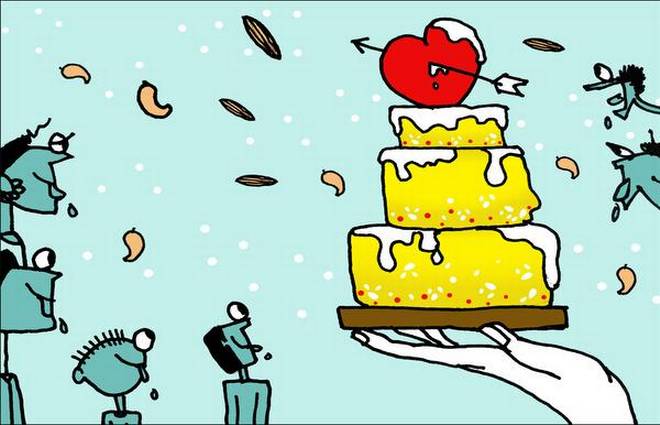All made-to-order at home, in the hands of an expert who enjoyed what he did
He was a master creator of wedding cakes that enhanced the sweet start to a marriage… Naidu, tall, dignified and gentle with greying hair, hailed from the Austin Town area of Bengaluru. My parents living in Fraser Town engaged his cake-crafting services for each of the four weddings in the family during the 1960s and 1970s.
Mum would purchase the ingredients and ensure the fruits and nuts were washed, cleaned and dried in advance. Embarking on his task, Naidu meticulously hand-chopped the dry fruit/nuts with such speed and aplomb, one feared for the safety of his fingers. The resulting material was generously sprinkled in with dose measures from the rum or brandy bottle and left to soak for a month before he’d actually blend in the other ingredients, such as flour, butter, sugar, eggs, baking powder and vanilla essence along with a few pinches of ground spices for additional flavour. He’d fold in all of it, so seemingly effortlessly, as he used the wide span of his hands and the flexibility of his long fingers to get the mix just right for baking.
No clumps of fruit dare ruin it. The enabling gadgets of today that fluidly spin everything around just did not exist. Caramelising sugar to the right degree of deep colour and consistency was another art.
As a teenager I would watch in awe as he deftly ploughed through the mixing to dissolve lumps or clumps that might leave a blemish in it. The usual wooden stirrer with a rounded head piece used as a cake-mixer or masher in the kitchen was like a toy before this huge quantity. Hence Naidu used his hands. The vessel containing the raw mixture was enormous and he’d have it carted in a cycle-rickshaw to be bakery oven elsewhere.
Once done, he’d return with the layers and props to start on the icing, also prepared to a fine consistency by him. Layering it on the top and the sides of the cake so evenly, he’d confidently complete the job — perhaps with a wide knife to smoothen the finish. There were no spatulas in those days.
Then followed the dainty decorations, like flowers and hearts pierced by an arrow, doves or whatever, plus a lacy edging. Naidu handcrafted the paper icing cones by cutting out the required sizes and shapes from brown paper. Not likely butter paper was available at that time, as baking tins too were papered with cut-to-shape newspaper, dabs of butter applied to avoid burning! Non-stick cookware was unheard of. Naidu’s incredibly artistic skills would work with a flourish and precision as he effectively brought the cakes to life with figurines. The only off-the-shelf product then available, sugared silver-coloured balls, would be affixed here and there to complete the process.
The plywood trick
The base layers were dummies, fashioned from thin plywood and iced over, with just one triangle of real cake inserted in between and carefully marked out by special borders in the lowest layer to be cut into by the wedded couple: woe if they misjudged the spot!
For the next wedding, the icing would be scraped off and fresh icing applied; the decorative bits would of course disappear into the mouths of eager kids attending the wedding, or perhaps be preserved as souvenirs by the newlyweds. Single slices for distribution to guests were cut and wrapped by him in cellophane paper. And finally the taste of the marvellous almond iced fruit cake was to be enjoyed in the eating.
Naidu was a maestro! He extended his endeavours to theme cakes for birthdays and short eats too; it was well worth observing his technique, the way he fashioned the pastry cases for baking, later filled with exotic contents. While a party was on, he’d be busy in the background turning out round after round of dainty hors d’oeuvres like cheese boats, dainty tarts and plenty else that melted away in eager mouths.
An old photograph in my collection made me recall this unique cake-creator of a half century ago…. He worked hard by himself, self-effacing, skilled to the core!
jacolaco7@gmail.com
source: http://www.thehindu.com / The Hindu / Home> Opinion> Open Page / February 11th, 2018
